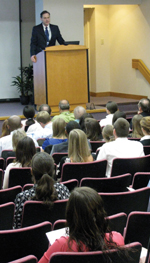|
By
Dawn Brazell
Public Relations
There's academic theory,
and then there's what happens in real life.
That's one lesson
participants in MUSC's Presidential Scholars Program found out
first-hand as they took what they are learning in their studies and
applied it to community health projects.
 Scholars
discuss their findings. Scholars
discuss their findings.
The Scholars presented
their research at a ceremony April 12, which this year included airing
commercials from each group that summarized the mission of their
various projects.
MUSC President Ray
Greenberg, M.D., Ph.D., praised the interprofessional teamwork that is
the keystone of the program enabling it to have such a powerful
influence on MUSC and the community.
 Dr. Ray Greenberg congratulates
this year's scholars on their community projects during a Presidential
Scholars Day ceremony. Dr. Ray Greenberg congratulates
this year's scholars on their community projects during a Presidential
Scholars Day ceremony.
"You can argue that it has
changed the university," he said of the program's impact.
Amy Blue, Ph.D.,
Presidential Scholars Program director and assistant provost of
education, said she's been with the program for three years and
continues to be amazed at what the groups accomplish in such a short
amount of time. When they start the year, they are given a topic and
have from September to the beginning of April to get their project
done, which really isn't much time, she said.
"This is in addition to
their regular academic activities. You have different personalities.
You have different professional perspectives. They look at existing
community needs and often assess them and work with a community
liaison. It's really impressive what they do."
This year, 41 MUSC
students and seven Charleston School of Law students participated. The
advisory group came up with broad topic areas, with the five groups
assigned to an area that fit into this year's theme: "Improving the
Community's Health." The groups examined five health issues in the
local community:
Cultural
contexts: Expanding knowledge about diabetes among
the local Hispanic community. The group developed easy-to-read
colorful brochures in Spanish to help the Hispanic community better
understand how to deal with a chronic condition.
Environmental issues: Improving
knowledge of proper medication disposal among pharmacists in Charleston
County. This group targeted how to raise awareness among
pharmacists to assist in the "crush don't flush" campaign to protect
the quality of drinking water.
Maternal/Child health:
Establishing community connections to
enrich the lives of pregnant teens. Working with the Florence
Crittenton Home, this group established community partnerships to
better aid the pregnant girls, age 10 to 21, that this home assists.
Mental Health/Substance
Abuse: Evaluating student knowledge of mental
health/substance abuse services in Charleston. This group
evaluated the MUSC students' awareness about the available resources to
help people deal with mental health and substance abuse issues and will
be sharing survey results to help those resources be better utilized.
Preventive Health:
Health literacy focusing on reading
nutrition labels. Working with the Trident Literacy Association,
this group developed a study module aimed at improving reading skills
and teaching the basic skills of reading a nutrition food label given
research that shows low literacy levels are associated with poorer
health outcomes.
 Blue said a
new part of the program this year that was a success was having all the
groups join to do a health fair as a community service project at the
Carolina Youth Development Center. Preventive health and health career
booths were set up for the event. Blue said a
new part of the program this year that was a success was having all the
groups join to do a health fair as a community service project at the
Carolina Youth Development Center. Preventive health and health career
booths were set up for the event.
The Scholars are selected
students from MUSC's six colleges who undergo a competitive application
process to participate in the two-semester program. They are joined by
selected faculty scholars representative of each college.
"For the students, they really do get a better understanding of each
other's professions and a better appreciation for interprofessional
collaboration," she said. "They also get a better idea of community
health needs and the complexities of engaging in community health
related work for their projects."
Because of the experience,
several students have gravitated toward more public aspects of health
care or even changed career paths, she said. They realize they can
create change. Blue said she receives regular inquiries about the
program, which serves as a national model for interprofessional
education in what has become a powerful community outreach tool.
"It's a wonderful way for
students to learn about community health needs because that's not
emphasized a lot in their curriculum. It benefits the institution
because our students are out in the community, and they are wonderful
ambassadors. The work they do is with all sorts of projects. It may
seem on the one hand small in scope, but they also can have a large
impact."
For information on
Presidential Scholars, visit http://academicdepartments.musc.edu/pres_scholars/index.html.
|



 Scholars
discuss their findings.
Scholars
discuss their findings. Dr. Ray Greenberg congratulates
this year's scholars on their community projects during a Presidential
Scholars Day ceremony.
Dr. Ray Greenberg congratulates
this year's scholars on their community projects during a Presidential
Scholars Day ceremony.  Blue said a
new part of the program this year that was a success was having all the
groups join to do a health fair as a community service project at the
Carolina Youth Development Center. Preventive health and health career
booths were set up for the event.
Blue said a
new part of the program this year that was a success was having all the
groups join to do a health fair as a community service project at the
Carolina Youth Development Center. Preventive health and health career
booths were set up for the event.